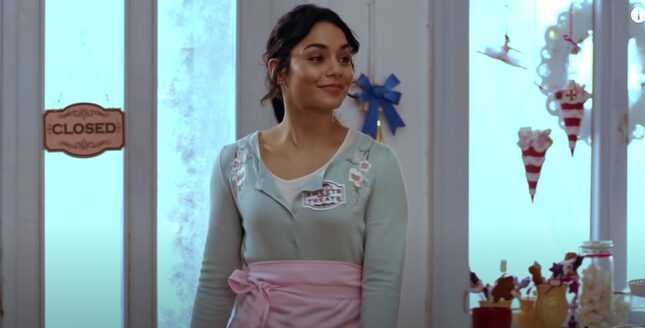The Hilariously Specific Career Options for Christmas Movie Heroines
Baker, toy store owner, baker, romance writer, baker, baker, baker...
EntertainmentTV
Screenshot: Netflix
Anyone flipping through any television in America between late October and January—whether it’s connected to cable or just Netflix—is practically guaranteed to stumble across a rom-com with protagonists unnervingly dedicated to Christmas cookies. Often, it will follow the emotional journey of a woman with a big-city corporate job as she slowly realizes, thanks to the power of a nostalgic family celebration, that she wants a slower pace of life with her high school sweetheart, whom she never quite forgot.
It is a cliche at this point that the lawyers and Very Important Businesswomen of the made-for-TV Christmas movie will inevitably find themselves disenchanted with their stressful careers. The specifics of those careers don’t matter and therefore are glossed over; what matters is that the job prevents them from slowing down and savoring life with a hunky Christmas tree farmer or Christmas cookie company owner. Less discussed: the jobs which the heroines of these movies do have. Normie jobs with decent salaries and work-life balance that leave room and money for a passionate hobby of handcrafting Christmas village houses simply won’t do. Rather, these movies often feature fantasy jobs that bear a closer resemblance to Pinterest than any stats from the Department of Labor. The kind of job that makes the viewer idly build a fantasy life in rural Vermont around the concept while melting into the couch wearing pajama pants, even if they’ve never, ever handmade a batch of cookies.
One acceptable career option is to be, specifically, a small-town doctor who knows everybody, delivers every baby, and splints every Little League injury before handing a lollipop to that scamp Timmy Sanders—but never, ever has to deal with the opioid epidemic or a particularly terrible workplace injury down at the local factory. In The Christmas Cure, an emergency-room doctor has to decide if she’s going to take over her father’s family practice. In Christmas Under Wraps, Candace Cameron Bure’s prestigious fellowship falls through and she finds herself running a doctor’s office in Garland, Alaska. (In that one, she ends up marrying the literal son of Santa.)
Then you’ve got your retailers. The protagonists of A Very Vintage Christmas and A Very Merry Mix-Up own antique stores. (The heroine of A Merry Christmas Match works at her mother’s antique store, but she spends much of the movie planning the town Christmas pageant and wondering if she should have been a theater director instead.) In Nantucket Noel, she’s a toy-store owner and her store is located picturesquely on a wharf. The hilariously named A Very Merry Toy Store features competing toy store owners—forced to work together to defeat a big-box store. (Played by Melissa Joan Hart and Mario Lopez, no less.) In Christmas with Holly, the protagonist has already dumped her big-city life after being left at the altar when she opens her toy store.
-

-

-

-

-

-

-

-

-

-

-

-

-

-

-

-

-

-

-

-

-

-

-

-

-

-

-

-

-

-

-

-

-

-

-

-

-

-

-

-








































